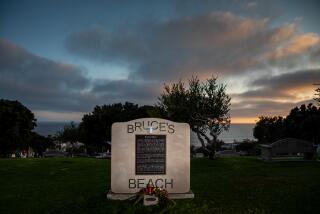Finding Your Money Where Your Mouse Is
- Share via
There is money to be had on the Internet after all.
Perhaps not for ill-conceived dot-coms. Or suckers who throw away money on get-rich-quick spams. But for thousands of Internet users, plenty of cash awaits just a few clicks away.
The state of California will dispense tens of millions of dollars this year to Internet users via its Unclaimed Property Web site, at https://scoweb.sco.ca.gov/scoucp/inquiry.
The money comes from abandoned bank accounts and safe deposit boxes, unclaimed settlements and life insurance benefits that people, or their heirs, have forgotten over the years.
The lure of easy money makes searching the site feel like playing an online lottery, except that it’s better--you don’t need to buy a ticket or pay a fee. And your odds of winning go up the more forgetful you’ve been.
Of course, the argument can be made that no one’s “winning” anything because the only money to be had is money you already own. But it’s still cash you didn’t have at hand until now.
Visitors can search by individual or business name and by city. If you are looking for a relative’s lost assets, you don’t need to know an exact spelling; you can search by a partial name.
If you find a suspected match, click on the “Claim” button to see more information about the lost account, as well as instructions for claiming the money.
“For security reasons and identification purposes, we can’t actually take the claim online,” explained Lisa Casalegno, a spokeswoman for the state controller’s office, which operates the site.
“We have to have a signature and clarifying paperwork to make sure we’re getting the right people.”
Claimants must send a copy of their current driver’s license and social security card, as well as any documents, such as an old bank statement, that would prove the person filing the claim is the person owed the money.
If all the paperwork is in order, an individual can expect to get the money within 30 days, Casalegno said. She estimated that 60% of the state’s claims start with a search on the Web site.
The state has about $2.8 billion awaiting claim, Casalegno said. With 5.3 million names in the state’s database, that works out to an average of a little more than $500 per name.
“It’s all over the map,” Casalegno said of the amounts available. “It might be something for $12, but last year, there was someone who had a million-dollar claim.”
The kitty’s growing too. Casalegno said the state will pay out about $100 million this year but will collect more than $370 million in newly “lost” funds.
Other states post their unclaimed property online as well. Go to https://www.missingmoney.com to search for lost accounts from 28 states. (California is not included.)
Missingmoney.com combines the data from those states onto one search form. It can make the search more convenient, but if you have a common name, the combined search means you’ll have to scroll past dozens of results from states where you’ve never lived or worked.
But Missingmoney does allow visitors to search by Social Security number, which eliminates any uncertainty about whether you are the person owed the money, should your search turn up a hit.
Again, you’ll have to go offline to send in the paperwork to complete your claim.
Finally, onetime residents of other states can find links to all 50 states’ unclaimed property Web sites by visiting https://unclaimed.org/find_property.
*
Robert Niles is a producer at Latimes.com.
(BEGIN TEXT OF INFOBOX / INFOGRAPHIC)
Find It
A 10-part series:
1. Beach ratings
2. Physicians
Today: Unclaimed property
4. Campaign contributions
5. Restaurants
6. Crime reports
7. Dentists and hygienists
8. School test scores
9. Birth and death records
10. Contractors
More to Read
Inside the business of entertainment
The Wide Shot brings you news, analysis and insights on everything from streaming wars to production — and what it all means for the future.
You may occasionally receive promotional content from the Los Angeles Times.









